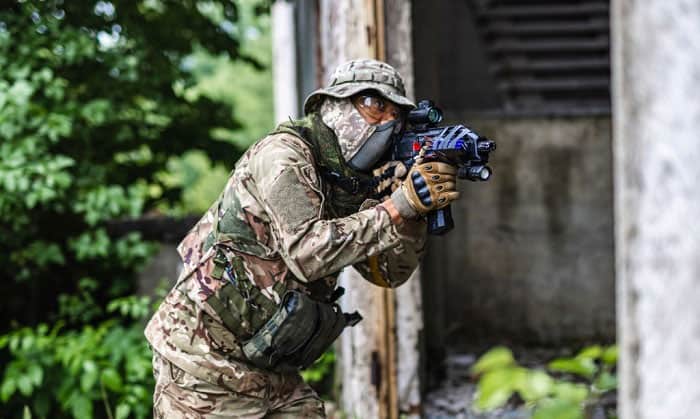A military imposter is someone who makes false claims about his or her military service. It can be claims made from a person who has never been in the military or a veteran about ungenuine embellishments. In the United States, this type of behavior is called “stolen valor”, and the military imposters can also be referred to as “military phonies” or “military posers”.
Military imposters do this to gain tangible and intangible benefits, such as money and respect, respectively. Since the pandemic, military impersonation has been on the rise. So, how to spot a military impostor? Today’s article will provide essential information and tips. In addition, we will share a few examples of military imposters exposed! Therefore, be sure to read until the very end.
Table of Contents
Are There Penalties for Military Imposters
First, before we go into the details of how to spot a fake military person, let’s make one thing clear: impersonating military personnel is a serious crime.
The “Stolen Valor Act of 2013” states that it is a federal offense to make false claims about receiving a major military award(s) in order to acquire tangible benefits, such as money and property.
There are other laws that criminalize the act of forging or altering discharge documents to receive veteran benefits as well. You can find more information about the criminal policies concerning impersonating a soldier or service member here.
Where Will You Encounter Military Imposters
You can run into military imposters both online and offline. While there are no “designated” places for the imposters, in-person, many are spotted showing off at the bar or pub, and virtually on online dating sites.
They can scam you directly or indirectly. For instance, by asking you personally to wire them money for “support” during/after service or by requesting extra monetary “consideration” as a veteran for a good or service. Examples of the latter include but are not limited to: discounts, vouchers, cashback, etc.
Recognizing Military Imposters
What You Will Need to Have
There are not a lot of things you need to prepare to spot a military imposter. You might want to have a phone with Internet access for quick browsing, and if you are really invested in ousting this person, have something to take notes with. Most imposters tell a lot of stories and bust their own butt with details that do not go together. You can easily spot this if you note what they have said down.
To spot a fake soldier, you should ask questions and specific items you look for, and the same applies to spot a fake veteran. This section will take you through everything you need to do.
Ask…
It is difficult to tell that someone is a fake Army soldier just by looking at them, even if you have strong intuition. However, there are questions you can have to “hear” it for yourself. Start with the basic questions first:
- What unit were you in?
- What was your MOS?
- Where did you go for basic training?
Like imposters in any other field, there are amateur ones and professional ones. These basic questions can knock out the amateur fakers. If they hesitate, say they can’t remember or “it’s classified information”, you’ve got yourself a phony.
Note: When asking about the person’s unit, request a COMPLETE unit name, and for MOS, which stands for Military Occupational Specialty, ask for the code number.
However, professional con artists may have the answers prepared. So, “up the dose” by asking these two questions:
- Who was your favorite commander?
- Where were you last stationed?
If the person is telling you a lot of fantastic stories and you suspect that they are making things up, focus on the timeframes and dates that they are telling you. Fabricated stories will always have a messed-up timeline.
Another foolproof method to test the storyteller is to re-ask a small detail that they have already mentioned. It’s likely that they cannot remember what they have said as a lie, and will attempt to make another lie, which at that point, makes it clear they are an imposter.
If the person you are suspecting says that they are currently serving, ask for their Defense of Department (DoD) I.D number. If they do not have it memorized, they will look at their CAC or Common Access Card. Everyone who is currently in service should have one. Not having it is a big giveaway. Or, you can ask them where they can find the DoD I.D number and how many digits it is. If they can’t answer “on the back of the card” and “10 digits”, they’re a phony.
Look at…
If someone is fabricating that they are currently in the military, you can use this site to verify his or her service. You will need to put in the person’s Social Security Number (SSN) and a few other pieces of personal information. The system will scan the database to tell you if that person is in any military branches.
If the person is wearing military gear, look at:
- The branch insignia: The branch insignias should match. Most imposters have no real military knowledge, so they make silly mistakes like wearing an Army patch on the left pocket and a Navy edge on the left sleeve.
- The medals and ribbons placement: Imposters like to showcase all their medals and ribbons. But more doesn’t always mean better. The medals and ribbons may clash in terms of rewards date, and are thereby, dead giveaways: THE WEARER IS A PHONY!
- The name patch and qualification patch placement: The name patch should be on the right side, while the qualification patch is on or above the left pocket. If they are not in these positions, the person is a fake.
What Should You Do Once You Have Determined an Imposter
If you have found evidence that someone is a military imposter, you file a report by:
- Site – https://www.archives.gov/oig
- Hotline – 301-837-3500
- Mail – OIG Hotline, NARA, P.O. Box 1821 Hyattsville, MD 20788-0821
After all, the real heroes of the Armed Forces should be credited with respect. They deserve better than phonies that lie about themselves for monetary gains.
Examples of Military Imposters
Unfortunately, there have been many cases of military impersonation. Here, we present eight:
- Joseph A. Cafasso is an American con artist who used to be in Fox News as a military analyst, claimed to have been a Vietnam War veteran and Special Forces soldier. In reality, however, he only served 44 days in the Army (1976).
- Wes Cooley is a former U.S. Congressman who claimed to have served during the Korean War. Even though he was in the Army for two years, he was never in Korea. His lie was made in an official document.
- Brian Dennehy is an American actor who said he fought in the Vietnam War and sustained an injury. He was in the Marine Corps from 1959 to 1963. But he was not involved in the Vietnam War nor wounded.
- George Dupre is a Canadian who said that he worked for the SOE and French Resistance during the Second World War. Dupre wrote a book based on the fabricated experiences but was eventually ousted by a reporter in an interview.
- Ron Hubbard is famously known as the author and founder of Scientology. However, on Scientology, he claims to be a wounded war hero during hostilities, going as far as describing himself as a “Commodore of Corvette squadrons” in “all 5 theatres of the Second World War”.
- Jack Livesey is a British historian and military advisor for film productions who has dedicated 29 years to the Parachute Regiment. However, he was actually a cook in the Army Catering Corps for 3 years.
- Jesse Macbeth is an anti-war activist who claims to be a part of the Army Ranger and an Iraq War veteran. But he was discharged from the Army after only 44 days because he was “unfit for duty”.
- Walter Williams is a famous example of a military phony. He was believed and credited as the last surviving veteran of the American Civil War until he died in 1959. However, evidence later emerged that he lied about the year he was born and was only a young child when the war ended.
More examples of military imposters can be found here.
Conclusion
Hopefully, the above information on how to spot a military impostor was helpful. If you have anything to add or ask, leave a comment. We will get back to you as soon as possible. Also, be sure to share this with others so they won’t have to fall for fraud!

I am Everett Bledsoe, taking on the responsibility of content producer for The Soldiers Project. My purpose in this project is to give honest reviews on the gear utilized and tested over time. Of course, you cannot go wrong when checking out our package of information and guide, too, as they come from reliable sources and years of experience.



